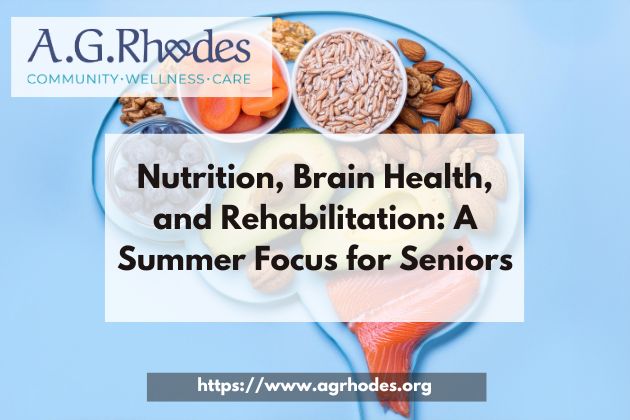The Vital Link Between Nutrition and Cognitive Function in Seniors

Research indicates that key nutrients such as omega-3 fatty acids, B vitamins, antioxidants, and polyphenols support brain function. These nutrients help reduce inflammation, promote neural regeneration, and protect the brain from oxidative stress. In the summer months, when fresh fruits, vegetables, and herbs are abundant, rehabilitation centers have a unique opportunity to boost brain health through seasonal meal planning.
The MIND Diet: A Cognitive-Boosting Blueprint for Rehab Settings
One research-backed dietary approach for improving brain function is the MIND diet—a combination of the Mediterranean and DASH diets. The MIND diet emphasizes foods such as:
- Leafy green vegetables (spinach, kale, arugula)
- Berries, especially blueberries and strawberries
- Whole grains, including oatmeal and quinoa
- Fish, rich in DHA and EPA (e.g., salmon, sardines)
- Nuts, particularly walnuts and almonds
- Beans and legumes for plant-based protein
- Olive oil as the primary fat source
Rehabilitation centers that integrate the MIND diet into their food services can support cognitive therapy outcomes by fueling residents’ brains with the nutrients they need to thrive.
Summer Superfoods to Power Brain Health
Summer offers a bounty of nutrient-rich foods that are ideal for senior rehabilitation settings. These seasonal superfoods not only nourish the body but also promote neurological well-being:
- Blueberries: Packed with antioxidants that delay brain aging and improve memory
- Tomatoes: Rich in lycopene, which may help protect against cognitive decline
- Avocados: Contain healthy fats that support healthy blood flow to the brain
- Watermelon: Hydrating and loaded with antioxidants and vitamin C
- Sweet corn: Contains lutein, known to support brain processing speed
- Cherries: Anti-inflammatory and can reduce oxidative stress in the brain
Providing seniors with these foods daily in creative and enjoyable ways—smoothies, salads, chilled soups, or light grilled entrees—can make a positive impact on brain health.
Hydration: A Silent Key to Cognitive Wellness
Hydration is often overlooked, yet it plays a crucial role in maintaining mental alertness and preventing confusion, especially in older adults. During the hot summer months, seniors are at increased risk of dehydration, which can exacerbate symptoms of dementia and increase the likelihood of hospitalization.
Encouraging the regular intake of water, herbal teas, and infused beverages like cucumber-mint or citrus-basil water can help seniors remain hydrated. Rehabilitation centers should monitor fluid intake closely and offer hydration support during outdoor activities and therapy sessions.
Complementing Alzheimer’s Therapy with Nutritional Strategies
For seniors undergoing Alzheimer’s therapy, nutritional support enhances the effectiveness of physical, occupational, and cognitive interventions. Several studies suggest that patients who receive targeted nutritional care show better outcomes in memory retention, mood regulation, and engagement during therapy.
Integrating a personalized nutrition plan alongside memory training, speech therapy, or exercise routines ensures a more holistic approach to senior rehabilitation. Food consistency, mealtime structure, and dining companionship also play a role in improving appetite and behavior in individuals with Alzheimer’s.
Key practices include:
- Offering finger foods for those who struggle with utensils
- Using contrast-colored plates to stimulate visual cues and appetite
- Providing smaller, nutrient-dense meals throughout the day
- Encouraging family-style dining to promote social engagement
The Role of Professional Dietitians in Senior Rehabilitation
Registered dietitians are essential members of the interdisciplinary rehab team. Their expertise ensures each resident’s dietary needs align with their therapy goals. From managing comorbidities like diabetes or heart disease to preventing unintentional weight loss in Alzheimer’s patients, dietitians play a key role in customizing menus and improving clinical outcomes.
At A.G. Rhodes and other leading senior care communities, collaborative care models that include medical, nutritional, and therapeutic professionals are becoming the standard of excellence. This integrative method ensures that every aspect of a senior’s rehabilitation supports brain health and functional recovery.
Creating Brain-Healthy Dining Experiences in Summer
Dining is more than nutrition—it’s an experience that influences mental well-being, social connection, and daily routine. Rehabilitation centers can create a stimulating and supportive mealtime environment by incorporating the following:
- Outdoor dining spaces to enjoy fresh air and sunshine
- Garden-to-table programs where residents help grow herbs or vegetables
- Themed meal nights to spark memory and joy (e.g., Mediterranean Mondays)
- Interactive cooking classes as part of occupational therapy
These experiences go beyond sustenance; they engage the senses, rekindle memories, and contribute to emotional health, key factors in Alzheimer’s therapy and overall rehabilitation success.
Empowering Seniors Through Holistic Nutrition and Rehabilitation
Nutrition is more than food on a plate—it’s a therapeutic tool that supports physical, emotional, and cognitive wellness. For seniors in rehabilitation, especially those living with Alzheimer’s or other neurodegenerative conditions, nutrition is an important part of the care plan.
We believe that every bite counts. By embracing seasonal foods, encouraging hydration, following evidence-based dietary models, and coordinating with skilled dietitians, we can enhance brain health and accelerate rehabilitation.
Partnering with A.G. Rhodes for Comprehensive Brain Health Support
At A.G. Rhodes, we are deeply committed to delivering compassionate, innovative, and holistic senior care. Our approach integrates nutritional excellence, evidence-based Alzheimer’s therapies, and enriching summer activities to ensure each resident thrives physically and cognitively. If you or your loved one is exploring options for senior rehabilitation with a strong focus on brain health and wellness, we invite you to learn more about our community and services.
Take the first step toward healthier living this summer—reach out to A.G. Rhodes today and discover how our specialized care can make a difference.

